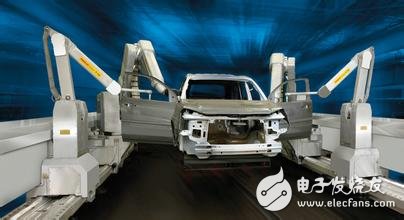The huge market expectation has attracted foreign mainstream robot manufacturers to step up the layout of the Chinese market. Germany's KUKA and Swiss ABB, Yaskawa Electric and Japan's FANUC and other four giants have been rushing to China in recent years, investing in Asia-Pacific production bases, ABB even put one of the global robot business headquarters and two production bases Shanghai. In fact, the current domestic robot market has been dominated by foreign giants. Multinational companies account for 90% of the Chinese robot market. Among them, Fanuc, Yaskawa, KUKA and ABB account for about 65% of the market. Although domestic robot companies represented by Xinsong Robot, Huichuan Technology, and Guangzhou Numerical Control have a strong development momentum, the gap with multinational giants is still large. The biggest problem is that the core components such as servo motors, reducers and controllers are not self-produced or cost-effective. Chinese companies are still at the low end of the global industrial chain. In the case of Siemens in Germany, Siemens itself does not manufacture robots. Instead, it provides technical support for programming software and controllers for robot development, which is to provide a "brain" for robots. According to Liang Naiming, CEO of Siemens Industrial Software Greater China, Siemens has launched a comprehensive strategic cooperation with KUKA to strengthen its leading position in related fields. Fortunately, the stock of Chinese robots is still very small. So how do domestic manufacturers change their market position in the incremental part of the upcoming explosion? "If China's robot industry wants to quickly promote its application, it must first solve the problem of cost and ease of use." Huichuan Technology Song Junen stressed that it must face the status quo of the industry and cannot be impetuous. Of course, the competitors of Chinese robotics companies now have spoilers like Google. “Yanchuan and Fanuc are of high level. But they are also traditional operating modes, which are all based on industry rules.†Xinsong robot Li Qingjie admits that the future of Google’s cross-border robots may exceed the normal industry development track. . He believes that Google wants to connect robotics with big data. "We may also work with companies with big data backgrounds." Whether the robot will affect the employment of workers, Li Qingjie believes that, on the surface, the development of robots will affect some employment; but the robot industry itself will generate a large number of employment opportunities. Research by Erik Brynjolfsson, a professor at the Massachusetts Institute of Technology, points out that new technologies have been creating jobs and undermining employment opportunities. But the data shows that new jobs are not generating as fast as they used to be. It can be seen that “machine substitution†should be dominated by the market and cannot be artificially promoted. TFT LCD Arduino TFT LCD Arduino,Active Matrix,LCD Module ESEN Optoelectronics Technology Co., Ltd, , https://www.esenlcd.com